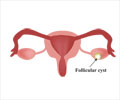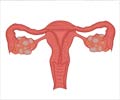Polycystic Ovarian Syndrome - Prognosis
Polycystic ovary syndrome may be regarded as a disorder that progresses until the time of menopause unless it is treated.
Untreated polycystic ovary syndrome may be regarded as a disorder that progresses until the time of menopause. The long-term consequences for PCOS are -
- Infertility
- Recurrent spontaneous abortion
- Depression/anxiety
- Abnormal lipid levels (Dyslipidemias)
- Hypertension
- Type 2 diabetes mellitus
- Coronary artery disease
- Cerebrovascular accidents
- Endometrial cancer
PCOS maybe exist in three forms – mild, moderate and severe and the prognosis varies accordingly.
In the mild forms of PCOD, the affected woman may have -
No abnormality of menstruations and may ovulate normally. It often takes these women longer than normal to conceive and has a higher chance of spontaneous miscarriage.
In moderate PCOD – There are menstrual irregularities or absence of menstruation and failure of ovulation.
The most severe form of PCOD is characterized by- Obesity, hirsutism, amenorrhea and infertility.
Weight loss by way of reduced carbohydrate intake and exercise is the most important intervention; this step alone can restore menstrual cyclicity and fertility, and provide long-term prevention against diabetes and heart diseases. A large body of evidence has demonstrated an association between insulin resistance and polycystic ovary syndrome. Because the syndrome is also associated with lipid abnormalities, affected women could benefit from measures to prevent heart disease and the other problems associated with long-standing hypertension and diabetes that are associated with the syndrome
Pregnancy rate with weight loss- Programs that have targeted weight loss alone have achieved pregnancy rates as high as 30 to 60 percent without medical intervention.
Estrogen levels and Cancer risks - Long-term effects of unopposed estrogen place women with the syndrome at considerable risk for endometrial cancer, endometrial hyperplasia and, perhaps, breast cancer.




















